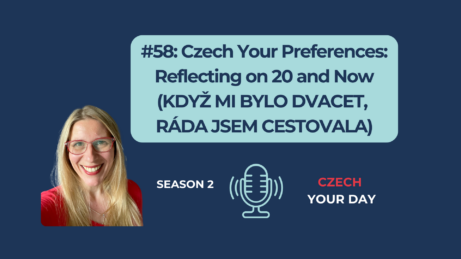Episode 8 (daily podcast CZECH YOUR DAY) transcript included

THIS WEEK’S TOPIC: WHAT TIME IS IT?/KOLIK JE HODIN?
THE TRANSCRIPT/HANDOUT IS DOWN BELOW
Understanding „Half Past“ in Czech
In Czech, expressing „It’s half past“ involves a key difference from English that lyou should note. Instead of stating the half-hour by referring to the past hour, Czechs refer to the UPCOMING hour.
For example:
- In Czech, půl čtvrté means „It’s 3:30,“ not 4:30 as you might expect if you directly translate.
Formal Czech: The Basics
Here’s a list of how you express „It’s half past“ with different hours, using the formal Czech:
- Je půl jedné (It’s 12:30)
- Je půl druhé (It’s 1:30)
- Je půl třetí (It’s 2:30)
- Je půl čtvrté (It’s 3:30)
- … and so on, up to Je půl dvanácté (It’s 11:30).
Informal Czech: How We Speak Daily
In less formal settings, like chatting with friends or family, Czech speakers often modify these expressions slightly, especially in Bohemia:
- Je půl jedný* (It’s 12:30)
- Je půl druhý* (It’s 1:30)
- Je půl třetí (It’s 2:30)
- Je půl čtvrtý* (It’s 3:30)
- … continuing similarly for all times.
The difference is subtle but important. The ending -é changes to -ý, a distinctive feature in informal Czech.
Komentáře








